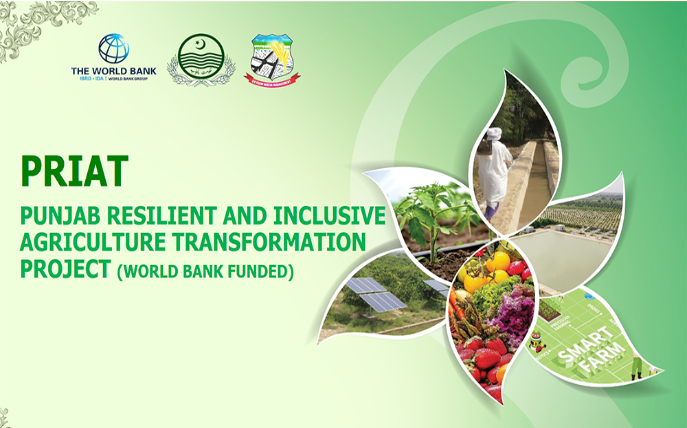Transformation of Punjabi Resilient and Inclusive Agriculture (PRIAT)
The Punjab Resilient and Inclusive Agriculture Transformation (PRIAT) project is a significant initiative aimed at transforming the agricultural sector in the Punjab province of Pakistan. Punjab is often referred to as the “breadbasket” of Pakistan, contributing around 60% of the national agricultural output. However, the sector faces several critical challenges, such as climate change, water scarcity, unsustainable farming practices, and limited inclusivity in terms of smallholder farmers and women’s participation. PRIAT is designed to address these issues by fostering resilience, inclusiveness, and sustainability in the agricultural system of Punjab.

Key Objectives of PRIAT

PRIAT is focused on achieving several interconnected objectives. The first is to enhance the resilience of agriculture to climate change and other environmental stresses. Punjab’s agriculture is highly vulnerable to the impacts of climate change, particularly in the form of extreme weather events like droughts, floods, and temperature fluctuations. These factors can lead to crop failures, livestock losses, and reduced yields, significantly affecting food security and livelihoods. PRIAT promotes the adoption of climate-smart agricultural practices that aim to mitigate these risks, such as the use of drought-resistant crop varieties, improved water management techniques, and soil health conservation.
The second major objective is to make agriculture more inclusive, especially for smallholder farmers, women, and marginalized communities. In Punjab, a significant portion of farmers are smallholders with limited access to modern technologies, financial services, and markets. PRIAT aims to bridge these gaps by facilitating access to credit, inputs, and training. It emphasizes the active participation of women in agriculture by empowering them through targeted training programs and ensuring their access to resources and decision-making platforms.

The third objective is to enhance productivity and sustainability. Traditional farming practices in Punjab often lead to land degradation, water wastage, and a decline in soil fertility. PRIAT promotes sustainable practices like crop diversification, precision agriculture, and efficient use of inputs such as fertilizers and pesticides. This not only helps to protect the environment but also increases productivity and profitability for farmers. Sustainable agricultural practices under PRIAT are also expected to reduce the over-reliance on water-intensive crops like wheat and rice, which have historically drained Punjab’s water resources.
Strategies and Interventions
To achieve its objectives, PRIAT employs a multi-pronged strategy. One of the primary interventions is improving water management. Punjab’s agriculture is highly dependent on irrigation, and the province faces growing water scarcity. PRIAT supports the introduction of modern irrigation techniques such as drip irrigation and laser land leveling, which can help optimize water use. Additionally, it focuses on improving the management of canal systems and groundwater resources.
Another key intervention is the promotion of climate-smart agriculture. This includes not only the introduction of climate-resilient crops but also fostering agroforestry, improved crop rotation, and integrated pest management. These measures help reduce the vulnerability of farming systems to climate change and contribute to the overall sustainability of agriculture in the region.
PRIAT also focuses on building the capacity of farmers by providing training in modern farming techniques, financial literacy, and business skills. By doing so, the project seeks to create a more entrepreneurial approach to farming, encouraging farmers to adopt innovations and engage more effectively in value chains.

Expected Impact
The expected impact of PRIAT is multi-dimensional. First, it aims to significantly improve the livelihoods of smallholder farmers by increasing their productivity and reducing their vulnerability to climate risks. This will contribute to rural poverty alleviation and better food security. Second, it aims to foster greater inclusivity by ensuring that women and marginalized groups play an active role in agricultural development. Third, PRIAT is expected to contribute to environmental sustainability by promoting farming practices that conserve natural resources, especially water and soil.
Overall, PRIAT represents a forward-looking approach to agriculture in Punjab. It addresses the immediate challenges posed by climate change and unsustainable practices while laying the groundwork for a more resilient, inclusive, and productive agricultural sector in the long term. Through its multi-faceted strategies, PRIAT aims to transform Punjab’s agriculture into a model of sustainability and inclusivity, setting an example for other regions facing similar challenges.
